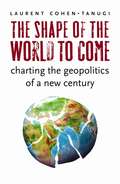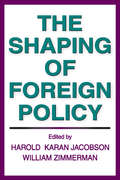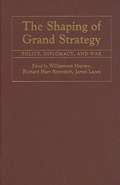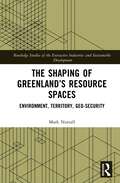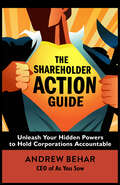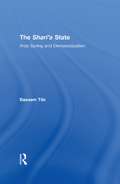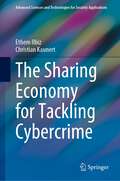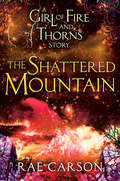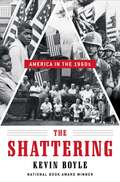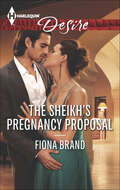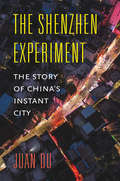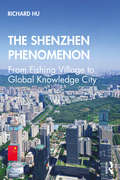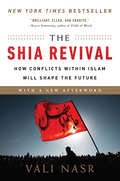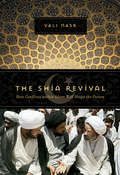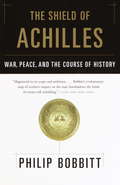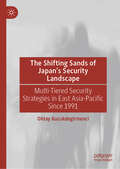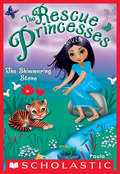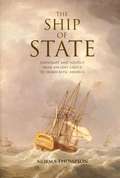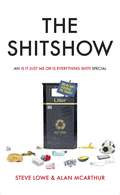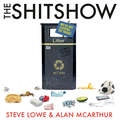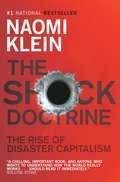- Table View
- List View
The Shape of the World to Come: Charting the Geopolitics of a New Century
by Laurent Cohen-TanugiContrary to an optimistic vision of a world "flattened" by the virtues of globalization, the sustainability and positive outcomes of economic and political homogenization are far from guaranteed. For better and for worse, globalization has become the most powerful force shaping the world's geopolitical landscape, whether it has meant integration or fragmentation, peace or war. The future partly depends on how new economic giants such as China, India, and others make use of their power. It also depends on how well Western democracies can preserve their tenuous hold on leadership, cohesion, and the pursuit of the common good.Offering the most comprehensive analysis of world politics to date, Laurent Cohen-Tanugi takes on globalization's cheerleaders and detractors, who, in their narrow focus, have failed to recognize the full extent to which globalization has become a geopolitical phenomenon. Offering an interpretative framework for thought and action, Cohen-Tanugi suggests how we should approach our new "multipolar" world-a world that is anything but the balanced and harmonious system many welcomed as a desirable alternative to the "American Empire." Cohen-Tanugi's point is not that the major trends of economic globalization, technological revolution, regional integration, and democratic progress are no longer at work. His argument is that economic globalization exists in a complex dialectic with the traditional geopolitics it has, ironically, helped to revive. This tension has created an ambivalent world that requires democracies to operate in two realms: the realm of economic integration and multilateralism-or peaceful, astrategic, "postmodern" internationalism-and the more traditional, even regressive realm of confrontation between national and regional strategies of power fought against a background of terrorism, civil wars, and nuclear proliferation.
The Shaping of Foreign Policy
by Harold Karanjacobson William ZimmermanHow are foreign policy decisions made? This volume shows the various approaches to answer this question. In their introduction, Jacobson and Zimmerman make clear the goals and techniques of the comparative analysis of foreign policy behavior and, following this, they provide seven basic essays exemplifying, with variations, the principal approaches used to explain foreign policy behavior: the systemic, the environmental, the societal, the governmental, and the idiosyncratic (or psychological).Jan F. Triska and David D. Finley illustrate the systemic approach as applied to Soviet-American relations. Harold and Margaret Sprout then deal with the significance of the physical environment in the study of international politics. Two essays follow--by, respectively, Karl W. Deutsch and Gabriel A. Almond--representing the merger of international and comparative studies in this field. The contribution by Henry A. Kissinger examines the relationship of certain governmental systems to foreign policy behavior.The editors' introduction and selections reflect excitingly and accurately the "state of the art" of comparative foreign policy analysis and place before the reader, in clear and compact form, the continuing dialogue among scholars about one of the most controversial areas in the study of political processes.
The Shaping of Grand Strategy: Policy, Diplomacy, and War
by Williamson Murray James Lacey Richard Hart SinnreichWithin a variety of historical contexts, The Shaping of Grand Strategy addresses the most important tasks states have confronted: namely, how to protect their citizens against the short-range as well as long-range dangers their polities confront in the present and may confront in the future. To be successful, grand strategy demands that governments and leaders chart a course that involves more than simply reacting to immediate events. Above all, it demands they adapt to sudden and major changes in the international environment, which more often than not involves the outbreak of great conflicts but at times demands recognition of major economic, political, or diplomatic changes. This collection of essays explores the successes as well as failures of great states attempting to create grand strategies that work and aims at achieving an understanding of some of the extraordinary difficulties involved in casting, evolving and adapting grand strategy to the realities of the world.
The Shaping of Greenland’s Resource Spaces: Environment, Territory, Geo-Security (Routledge Studies of the Extractive Industries and Sustainable Development)
by Mark NuttallThe book examines ideas about the making and shaping of Greenland’s society, environment, and resource spaces. It discusses how Greenland’s resources have been extracted at different points in its history, shows how acquiring knowledge of subsurface environments has been crucial for matters of securitisation, and explores how the country is being imagined as an emerging frontier with vast mineral reserves. The book delves into the history and contemporary practice of geological exploration and considers the politics and corporate activities that frame discussion about extractive industries and resource zones. It touches upon resource policies, the nature of social and environmental assessments, and permitting processes, while the environmental and social effects of extractive industries are considered, alongside an assessment of the status of current and planned resource projects. In its exploration of the nature and place of territory and the subterranean in political and economic narratives, the book shows how the making of Greenland has and continues to be bound up with the shaping of resource spaces and with ambitions to extract resources from them. Yet the book shows that plans for extractive industries remain controversial. It concludes by considering the prospects for future development and debates on conservation and Indigenous rights, with reflections on how and where Greenland is positioned in the geopolitics of environmental governance and geo-security in the Arctic. This book will be of great interest to students and scholars of environmental anthropology, geography, resource management, extractive industries, environmental governance, international relations, geopolitics, Arctic studies, and sustainable development.
The Shaping of Jewish Identity in Nineteenth–Century France
by Jay R. BerkovitzNineteenth-century French Jewry was a community struggling to meet the challenges of emancipation and modernity. This struggle, with its origins in the founding of the French nation, constitutes the core of modern Jewish identity. <P><P> With the Revolution of 1789 came the collapse of the social, political, and philosophical foundations of exclusiveness, forcing French society and the Jews to come to terms with the meaning of emancipation. Over time, the enormous challenge that the emancipation posed for traditional Jewish beliefs became evident. In the 1830s, a more comprehensive ideology of régénération emerged through the efforts of younger Jewish scholars and intellectuals. A response to the social and religious implications of emancipation, it was characterized by the demand for the elimination of rituals that violated the French conceptions of civilisation and social integration; a drive for greater administrative centralization; and the quest for inter-communal and ethnic unity. In its various elements, regeneration formed a distinct ideology of emancipation that was designed to mediate Jewish interaction with French society and culture. <P><P> In this book, Jay Berkovitz reveals the complexities inherent in the processes of emancipation and modernization, focusing on the efforts of French Jewish leaders to come to terms with the social and religious implications of modernity. All in all, his emphasis on the intellectual history of French Jewry provides a new perspective on a significant chapter of Jewish history.
The Shared Society: A Vision for the Global Future of Latin America
by Alejandro ToledoLatin America has gone through a major transformation in the past two decades. According to the United Nations, with the discovery of new oil and mineral deposits and increases in energy exports, manufacturing and tourism, Latin America's economic growth and development will only continue, foreign investment will increase, and the region's global influence will become greater and greater. This is an historic opportunity for Latin America. Yet, as Stanford economist and former Peruvian President Alejandro Toledo points out in his new book, The Shared Society, social strife threatens to undermine its recent economic and political progress. The specter of unsustainable growth and greed threatens to compromise the environment. Economic growth rates could slow and democracy could deteriorate into familiar forms of authoritarian populism. In The Shared Society, Toledo, whose tenure as president of Peru helped spur its economic renaissance, develops a plan for a future Latin America in which its population is not only much better off economically than today, but in which the vast 40 percent of Latin America's poor and marginalized are incorporated into a rising middle class, democratic institutions work more effectively, and the extraordinary ecosystem of Latin America is preserved. This is Toledo's vision for a just, sustainable, and prosperous shared society. To achieve this, Toledo lays out a set of principles and concrete, implementable ideas with which Latin Americans can reinvent themselves as a leading force for change in a continuously globalizing society beset by inequalities and global problems such as climate change and shortages of clean drinkable water, food security, human rights violations and weak democratic institutions. Toledo argues that only extraordinary efforts of vision, determination, courage and inspired leadership will set Latin America on the path to inclusive development, and this book provides a visionary manifesto and blueprint for creating that ideal shared society.
The Shareholder Action Guide: Unleash Your Hidden Powers to Hold Corporations Accountable
by Andrew Behar“A valuable call to action for small shareholders to change the ways big corporations do business.”—Robert Reich, former US Secretary of Labor Want to make misbehaving corporations mend their ways? You can! If you own their stock, corporations have to listen to you. Shareholder advocate Andrew Behar explains how to exercise your proxy voting rights to weigh in on corporate policies—you only need a single share of stock to do it. If you've got just $2,000 in stock, Behar shows how you can go further and file a resolution to directly address the board of directors. And even if your investments are in a workplace-sponsored 401(k) or a mutual fund, you can work with your fund manager to purge corporations from your portfolio that don't align with your values. Illustrated with inspiring stories of individuals who have gone up against corporate Goliaths and won, this book informs, inspires, and instructs investors how to unleash their power to change the world.
The Sharia State: Arab Spring and Democratization
by Bassam TibiSet against the backdrop of the Arab Spring, The Sharia State examines the Islamist concept of political order. This order is based on a new interpretation of sharia and has been dubbed "the Islamic state" by Islamists. The concept of "the Islamic state," has been elevated to a political agenda and it is this agenda that is examined here. In contrast to the prevailing view which sees the Arab Spring as a revolution, this book argues that the phenomenon has been neither a Spring, nor a revolution. The term 'Arab Spring,' connotes a just rebellion that led to toppling dictators and authoritarian rulers, yet in The Sharia State, Bassam Tibi challenges the unchecked assumption that the seizure of leadership by Islamists is a part of the democratization of the Middle East. Providing a new perspective on the relationship between the Arab Spring and democratization, this book is an essential read for students and scholars of Middle Eastern Studies, Islamic Studies and Politics.
The Sharing Economy for Tackling Cybercrime (Advanced Sciences and Technologies for Security Applications)
by Christian Kaunert Ethem IlbizThis book explains Europol’s online sharing platforms efforts in three major cybercrime areas: ransomware, money laundering with cryptocurrencies, and online child sexual exploitation that Europol has already pushed private and public actors to cooperate. Since the global financial crisis, online sharing economy platforms have made a significant impact on use of under-utilized resources. People who have a car (Uber) or a spare room (Airbnb) began to share their under-used assets with others for extra income. The success achieved by these online platforms that enable efficient use of limited resources raised a new discussion on whether a similar governance model can be implemented by public administrations where public resources are insufficient. Cybercrime is one of these fields where most law enforcement agencies have not got enough resources to tackle these crimes. They need the human and technical resources of the private sector for a safer society. This book, for the first time, seeks the answers to this question. It examines the feasibility of online sharing economy platforms to enhance public-private partnerships to tackle cybercrime. The European Union Policing Agency, Europol, is the first police organization to adopt a similar model to interact with policing agencies and private industry. Drawing on extensive research, the book offers crucial insights for policymakers, researchers, and the public interested in new trends in sharing economy, innovative governance models, public-private partnerships, and cybercrime investigations.
The Shattered Mountain
by Rae CarsonA powerful 50-page digital-only novella set in the world of Rae Carson's acclaimed and epic fantasy The Girl of Fire and Thorns. A teenage girl must fight to survive when her village is destroyed by enemy sorcerers.
The Shattering: America In The 1960s
by Kevin BoyleA Los Angeles Times Most Anticipated Book of Fall 2021 From the National Book Award winner, a masterful history of the decade whose conflicts shattered America’s postwar order and divide us still. On July 4, 1961, the rising middle-class families of a Chicago neighborhood gathered before their flag-bedecked houses, a confident vision of the American Dream. That vision was shattered over the following decade, its inequities at home and arrogance abroad challenged by powerful civil rights and antiwar movements. Assassinations, social violence, and the blowback of a “silent majority” shredded the American fabric. Covering the late 1950s through the early 1970s, The Shattering focuses on the period’s fierce conflicts over race, sex, and war. The civil rights movement develops from the grassroots activism of Montgomery and the sit-ins, through the violence of Birmingham and the Edmund Pettus Bridge, to the frustrations of King’s Chicago campaign, a rising Black nationalism, and the Nixon-era politics of busing and the Supreme Court. The Vietnam war unfolds as Cold War policy, high-stakes politics buffeted by powerful popular movements, and searing in-country experience. Americans’ challenges to government regulation of sexuality yield landmark decisions on privacy rights, gay rights, contraception, and abortion. Kevin Boyle captures the inspiring and brutal events of this passionate time with a remarkable empathy that restores the humanity of those making this history. Often they are everyday people like Elizabeth Eckford, enduring a hostile crowd outside her newly integrated high school in Little Rock, or Estelle Griswold, welcoming her arrest for dispensing birth control information in a Connecticut town. Political leaders also emerge in revealing detail: we track Richard Nixon’s inheritances from Eisenhower and his debt to George Wallace, who forged a message of racism mixed with blue-collar grievance that Nixon imported into Republicanism. The Shattering illuminates currents that still run through our politics. It is a history for our times.
The Sheikh's Pregnancy Proposal
by Fiona BrandThis sheikh must marry the mother of his child! Twenty-four hours before he's to formally announce his engagement to the bride his father has chosen, Sheikh Kadin Gabriel ben Kadir gives in to a rare moment of temptation. But when one night with Sarah Duval leads to pregnancy, he vows he'll be part of mother and child's life. His plan: replace one political marriage for another. He'll wed the captivating history teacher who arouses such powerful desire and keep his heart out of the bargain. But Sarah wants a soul mate. How can she promise forever to a man who has sworn never to be ruled by love?
The Shenzhen Experiment: The Story of China’s Instant City
by Juan DuA rural borderland just forty years ago, today Shenzhen is a city of twenty million and a technology hub. This success is attributed to its status as a Special Economic Zone, but no other SEZs compare. Juan Du looks to the past to understand why. It turns out that Shenzhen is no prefab “instant city,” but a place influenced by deep local history.
The Shenzhen Phenomenon: From Fishing Village to Global Knowledge City
by Richard HuThe Shenzhen Phenomenon is a comprehensive and systematic study about how Shenzhen, the world’s fastest growing city, has developed into an international metropolis from scratch within 40 years. It unravels the decision and policy making, planning, design, and development processes that have enabled the city’s rapid growth, and associated problems and paradoxes. It also reveals the politics and power that have propelled this experimental city to spearhead Deng Xiaoping’s ‘reform and opening-up’ agenda, which has made the city and remade the nation. This book demystifies several long-held misperceptions through identifying Shenzhen’s rise as an opportunity deriving from a crisis, as a product of both grassroots ingenuity and top vision, and as both a planned city and an unplanned city. Produced on the 40th anniversary of Shenzhen, this timely volume not only offers a comprehensive and systematic chronicle of the city, but also opens a window to understand China’s new city making and urbanisation. It will be of interest to academics, students and practitioners in the field of urban and Chinese studies, as well as urban planning and design.
The Shia Revival (Updates)
by Vali Nasr"Historically incisive, geographically broad-reaching, and brimming with illuminating anecdotes." --Max Rodenbeck, New York Review of Books One of America's leading commentators on current events in the Middle East, Iranian-born scholar Vali Nasr brilliantly dissects the political and theological antagonisms within Islam in this "smart, clear and timely" book (Washington Post). Still essential and still timely ten years after its original publication, The Shia Revival provides a unique and objective understanding of the 1,400-year bitter struggle between Shias and Sunnis and sheds crucial light on its modern-day consequences. A new epilogue elucidates the rise of ISIS and ongoing tensions between Iran and Saudi Arabia.
The Shia Revival: How Conflicts within Islam Will Shape the Future
by Vali Nasr"Historically incisive, geographically broad-reaching, and brimming with illuminating anecdotes."--Max Rodenbeck, New York Review of Books Iranian-born scholar Vali Nasr has become one of America's leading commentators on current events in the Middle East, admired and welcomed by both media and government for his "concise and coherent" analysis (Wall Street Journal, front-page profile). In this "remarkable work" (Anderson Cooper), Nasr brilliantly dissects the political and theological antagonisms within Islam, providing a unique and objective understanding of the 1,400-year bitter struggle between Shias and Sunnis and shedding crucial light on its modern-day consequences.
The Shield of Achilles
by Philip Bobbitt"We are at a moment in world affairs when the essential ideas that govern statecraft must change. For five centuries it has taken the resources of a state to destroy another state . . . This is no longer true, owing to advances in international telecommunications, rapid computation, and weapons of mass destruction. The change in statecraft that will accompany these developments will be as profound as any that the State has thus far undergone."--from the PrologueThe Shield of Achilles is a classic inquiry into the nature of the State, its origin in war, and its drive for peace and legitimacy. Philip Bobbitt, a professor of constitutional law and a historian of nuclear strategy, has served in the White House, the Senate, the State Department, and the National Security Council in both Democratic and Republican administrations, and here he brings his formidable experience and analytical gifts to bear on our changing world. Many have observed that the nation-state is dying, yet others have noted that the power of the State has never been greater. Bobbitt reconciles this paradox and introduces the idea of the market-state, which is already replacing its predecessor. Along the way he treats such themes as the Long War (which began in 1914 and ended in 1990). He explains the relation of violence to legitimacy, and the role of key individuals in fates that are partially--but only partially--determined.This book anticipates the coalitional war against terrorism and lays out alternative futures for the world. Bobbitt shows how nations might avoid the great power confrontations that have a potential for limitless destruction, and he traces the origin and evolution of the State to such wars and the peace conferences that forged their outcomes into law, from Augsburg to Westphalia to Utrecht to Vienna to Versailles.The author paints a powerful portrait of the ever-changing interrelatedness of our world, and he uses his expertise in law and strategy to discern the paths that statehood will follow in the coming years and decades. Timely and perceptive, The Shield of Achilles will change the way we think about the world.From the Hardcover edition.
The Shield of Achilles: War, Peace, and the Course of History
by Philip BobbittHistory of war and international relations with commentary and theses.
The Shifting Sands of Japan's Security Landscape: Multi-Tiered Security Strategies in East Asia-Pacific Since 1991
by Oktay KucukdegirmenciThis book examines how and where Japan's multi-tiered security approach, which was put forward as a policy that emphasizes Japan's more active role in shaping the regional security order in the light of the changing geopolitical balances in the East Asia-Pacific in the post-Cold War period, has evolved in the context of China's rise in the 2000s, 2010s and present. This book categorizes Japan's foreign and security policy into three tiers: bilateralism, multilateralism, and minilateralism. The book offers valuable insights into Japan's foreign and security policies within East Asia and the broader Asia-Pacific region, including the region's geopolitical landscape and Japan's relationships with major stakeholders. It also contributes to understanding inter-regional dynamics and the application of balance of power theory. The book targets policymakers involved in foreign and security policy decisions, as well as academics, researchers, journalists, and international relations students interested in Japan and the East Asia/Indo-Pacific region.
The Shimmering Stone: The Shimmering Stone (The Rescue Princesses #8)
by Paula HarrisonThese are no ordinary princesses--they're Rescue Princesses!In the foothills of a towering mountain, Princess Amina lives with her family in the Kingdom of Kamala. Soon, her fellow Rescue Princesses will be visiting to attend her cousin's wedding.When a wounded tiger is found in the hills and taken to the local animal hospital, Amina is worried. She knows the tiger's cubs can't survive without their mother. The Rescue Princesses must find them, royal wedding or no royal wedding!
The Ship of State: Statecraft and Politics from Ancient Greece to Democratic America
by Norma ThompsonThe stimulus for this book initially came from Tocqueville's study of America.
The Shitshow: An ‘Is It Just Me Or Is Everything Shit?' Special
by Steve Lowe Alan McArthurIt was shit. Then the shit hit the fan. Would someone find a way of making it worse? Of course they would! Welcome to THE SHITSHOW...'There's a lot going on these days. Trump, Brexit, Call the Midwife . . . The rise of the robots . . . The rise of Easy Peelers . . .The authors of the bestselling Is It Just Me Or Is Everything Shit? series present an hilarious examination of the new age, asking:~Is Donald Trump a literary character?~The AI/robot takeover: has it already happened?~Are the animals ganging up on us too?~What is an LGBT sandwich?~Would you like to make it as an influencer?~Is Brexit Britain like the 1950s, or the 1930s, or, er, the 780s?~What is 5G?~What is consciousness?~Do you need a smart toilet?~Are you stronger than clickbait?Just get on with it!Whatever 'it' is.
The Shitshow: An ‘Is It Just Me Or Is Everything Shit?' Special
by Steve Lowe Alan McArthurIt was shit. Then the shit hit the fan. Would someone find a way of making it worse? Of course they would! Welcome to THE SHITSHOW...'There's a lot going on these days. Trump, Brexit, Call the Midwife . . . The rise of the robots . . . The rise of Easy Peelers . . .The authors of the bestselling Is It Just Me Or Is Everything Shit? series present an hilarious examination of the new age, asking:~Is Donald Trump a literary character?~The AI/robot takeover: has it already happened?~Are the animals ganging up on us too?~What is an LGBT sandwich?~Would you like to make it as an influencer?~Is Brexit Britain like the 1950s, or the 1930s, or, er, the 780s?~What is 5G?~What is consciousness?~Do you need a smart toilet?~Are you stronger than clickbait?Just get on with it!Whatever 'it' is.
The Shitshow: An ‘Is It Just Me Or Is Everything Shit?' Special
by Steve Lowe Alan McArthurIt was shit. Then the shit hit the fan. Would someone find a way of making it worse? Of course they would! Welcome to THE SHITSHOW...'There's a lot going on these days. Trump, Brexit, Call the Midwife . . . The rise of the robots . . . The rise of Easy Peelers . . .The authors of the bestselling Is It Just Me Or Is Everything Shit? series present an hilarious examination of the new age, asking:~Is Donald Trump a literary character?~The AI/robot takeover: has it already happened?~Are the animals ganging up on us too?~What is an LGBT sandwich?~Would you like to make it as an influencer?~Is Brexit Britain like the 1950s, or the 1930s, or, er, the 780s?~What is 5G?~What is consciousness?~Do you need a smart toilet?~Are you stronger than clickbait?Just get on with it!Whatever 'it' is.
The Shock Doctrine: The Rise of Disaster Capitalism
by Naomi KleinThe shock doctrine is the unofficial story of how the "free market" came to dominate the world, from Chile to Russia, China to Iraq, South Africa to Canada. But it is a story radically different from the one usually told. It is a story about violence and shock perpetrated on people, on countries, on economies. About a program of social and economic engineering that Naomi Klein calls "disaster capitalism."Based on breakthrough historical research and 4 years of reporting in disaster zones, Klein explodes the myth that the global free market triumphed democratically, and that unfettered capitalism goes hand-in-hand with democracy. Instead, she argues it has consistently relied on violence and shock, and reveals the puppet strings behind the critical events of the last 40 years."The shock doctrine" is the influential but little understood theory that in order to push through profoundly unpopular policies that enrich the few and impoverish the many, there must be a collective crisis or disaster—real or manufactured. Klein vividly traces the origins of modern shock tactics to the economic lab of the University of Chicago under Milton Friedman in the 60s, and beyond to the CIA-funded electroshock experiments at McGill in the 50s which helped write the torture manuals used today at Guantanamo Bay. She details the events of the recent past that have been deliberate theatres for the shock doctrine: among them, Pinochet’s coup in Chile in 1973, the Tiananmen Square Massacre in 1989, the collapse of the Soviet Union in 1991; and, more recently, the September 11 attacks, the invasion of Iraq, the Asian tsunami and Hurricane Katrina. And she shows how—in the hands of the Bush Administration—the "war on terror" is a thin cover for a thriving destruction/reconstruction complex, with disasters, wars and homeland security fuelling a booming new economy. Naomi Klein has once again written a book that will change the way we see the world.
